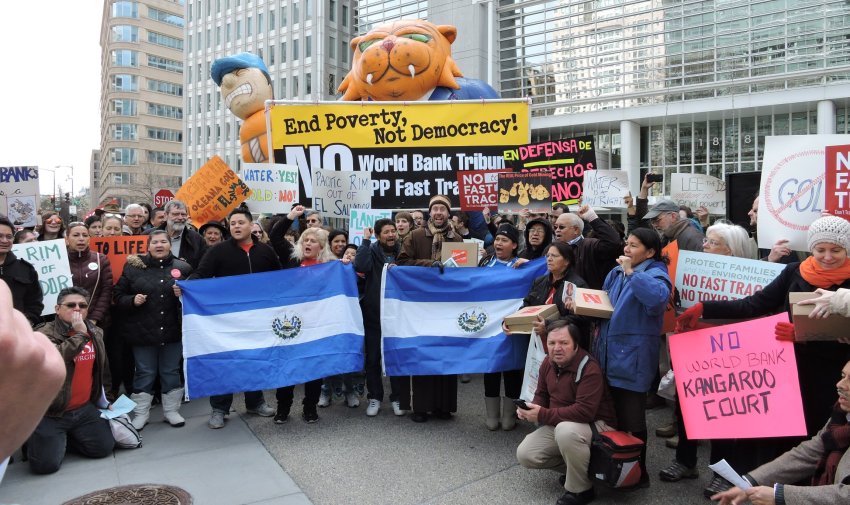
A little-known but controversial World Bank tribunal has bucked tradition and ruled against corporate power on October 14.
The tribunal rejected Canadian-Australian gold mining giant OceanaGold’s claim that El Salvador interfered with its profits when the government pulled the plug on a proposed gold mine.
The seven-year, multi-million dollar, largely secretive court battle had pitted mining-affected Salvadoran communities — supported by international human rights groups — against the deep pockets of OceanaGold.
The battle took place in an international trade tribunal that has been criticised as a “kangaroo court” in favour of corporate power. However, the court ultimately awarded El Salvador’s government US$8 million to cover legal fees and costs.
The conflict sparking the $301 million lawsuit dates back to 2007. El Salvador took a stand for national sovereignty and clean water by denying OceanaGold, then Pacific Rim, a new permit to extract gold in the Central American country.
The government raised concerns over the failure of the company’s El Dorado gold mine to live up to national standards regulating the industry. This included the fact that it dodged submitting a feasibility study and Environmental Impact Assessment for the project. The corporation saw this decision as an assault on its profits and retaliated.
In 2009, Pacific Rim levelled a US$77 million lawsuit against El Salvador in the World Bank’s investor-state tribunal, the International Center for the Settlement of Investment Disputes. The body allows corporations to sue governments for perceived infringement on their future profits.
The mining giant later upped the price tag on the suit to a whopping $301 million — equivalent to three years of El Salvador’s public spending on health, education, and public security combined.
The government primarily rejected OceanaGold’s proposed mine over fears of water pollution and scarcity in the country, the most water-stressed in Central America. Water quality is a major problem in El Salvador, where about 90% of surface water resources are considered unsafe to drink by international standards. Metal mining has been a big offender in fomenting the contamination crisis.
“By allowing transnational companies to blackmail governments to try to force them to adopt policies that favour corporations, investor-state arbitration undermines democracy in El Salvador and around the world,” said Marcos Orellana of the Centre for International Environmental Law.
“Regardless of the outcome, the arbitration has had a chilling effect on the development and implementation of public policy necessary to protect the environment and the human right to water.”
Not only is the gold mining industry notorious for toxic metals into surface and groundwater systems through its cyanide-intensive extraction process, but it is also sucks up staggering amounts of water on a daily basis. OceanaGold’s proposed mine would have used thousands of tons of cyanide and hundreds of thousands of litres of water every day it operated in the parched country.
In 2009, the same year Pacific Rim filed the lawsuit against El Salvador, the newly-elected left-wing FMLN government tried to institutionalise an official moratorium on mining concessions.
Though the law has not been passed, the government has continued to uphold a ban on new mining projects. Meanwhile, local water defenders have fought for years — together with the FMLN — to pressure lawmakers to enshrine the human right to water in the constitution and force corporations to act to preserve the precious resource.
To date, the conservative-dominated Congress has opted to continue shielding private profits instead of introducing industry regulation.
Despite the outcome of this shock ruling, El Salvador’s fight to protect water, the environment and human rights is far from over. Corporate globalisation and “free trade” creates the conditions for corporations to do business with impunity across the globe.
[Reprinted from TeleSUR English.]